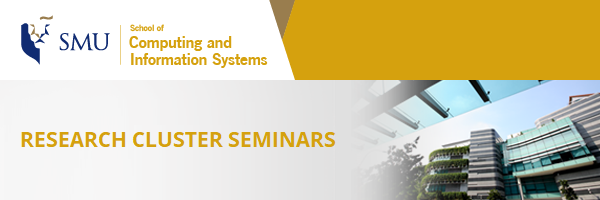| |
|

|
| Date: |
25 August 2023, Friday |
| Time: |
3:30 pm to 5:15 pm |
| Venue: |
School of Economics/School of Computing & Information Systems 2, Basement 1, Seminar Room B1-1 |
|

Limited seating. Registration will close by 17 August 2023 or once maximum capacity is reached. Registration is required for attendance. Light refreshment will be provided after the talks.
| Research Cluster: Artificial Intelligence & Data Science |
|
| Topic: |
VLStereoSet: A Study of Stereotypical Bias in Pre-trained Vision-Language Models
|
| Speaker: |
ZHOU Kankan, PhD Candidate
|
| Abstract: |
In this paper we study how to measure stereotypical bias in pre-trained vision-language models. We leverage a recently released text-only dataset, StereoSet, which covers a wide range of stereotypical bias, and extend it into a vision-language probing dataset called VLStereoSet to measure stereotypical bias in vision-language models. We analyze the differences between text and image and propose a probing task that detects bias by evaluating a model’s tendency to pick stereotypical statements as captions for anti-stereotypical images. We further define several metrics to measure both a vision-language model’s overall stereotypical bias and its intra-modal and inter-modal bias. Experiments on six representative pre-trained vision-language models demonstrate that stereotypical biases clearly exist in most of these models and across all four bias categories, with gender bias slightly more evident. Further analysis using gender bias data and two vision-language models also suggest that both intra-modal and inter-modal bias exist. |
|
|
| Research Cluster: Human-Machine Collaborative Systems |
|
| Topic: |
Using Large Language Models to Support Human-Robot Collaboration
|
| Speaker: |
LI Jiannan, Assistant Professor of Computer Science (ABD)
|
| Abstract: |
Designing for human-robot collaboration (HRC) is difficult due to the diversity and unpredictability of human behaviour while task-specific policies are hard to generalize to arbitrary scenarios. This talk introduces a novel approach for HRC that utilizes large-language models (LLMs) to synthesize information about the task, environment, and human partner to generate robot behaviours to facilitate the collaborative task. The new system, LingoBot, demonstrates this approach on a tabletop robot arm within a pick-and-place task context. LingoBot actively monitors the environment, user's actions, and dialogue, and autonomously determines appropriate actions to assist in the collaboration. Actions can include proactively passing nearby objects to the human or reactively assisting by mirroring the human’s actions. In an evaluation, participants performed collaborative sorting across a range of task conditions with LingoBot. The results suggest that LLMs can generate complementary actions to support the human-robot partnership across a diverse range of tasks and contexts. This talk concludes by discussing some ongoing work on incorporating vision-language models to better ground robot planning in physical contexts. |
|
|
| Research Cluster: Information Systems & Technology |
|
| Topic: |
The Reality of Quantum Computing Now
|
| Speaker: |
PAUL Griffin, Associate Professor of Information Systems (Practice)
|
| Abstract: |
Quantum computers have already been shown to have significant advantage over classical computers for certain types of problems and many real quantum computers now exist. However, we are still not seeing their use in practice and this talk will explain the challenges involved in providing quantum advantage and when we will start seeing real advantages in use in practice. |
|
|
|
| ABOUT THE SPEAKER(S) |
|
|
 |
Kankan Zhou received his bachelor’s degree in computer science from Nanyang Technological University (NTU), Singapore, in 2014 and master’s degree in computing from National University of Singapore (NUS), in 2016. Kankan has more than 10 years working experience in AI & Analytic field with different companies such as Oracle Singapore, Aon Singapore, and Accenture Singapore, etc. Now he is pursuing the part time Ph.D. degree in computer science in Singapore Management University (SMU) under the supervision of Prof. Jing Jiang and work as full time SCIS undergraduate instructor in SMU. His research focuses on natural language processing. |
|
|
 |
LI Jiannan is currently an Assistant Professor (ABD) in Computer Science at the School of Computing and Information Systems, SMU. His research interest lies at the intersection of Human-Computer Interaction, Human-Robot Interaction, and Virtual Reality, with a focus on building robotic and virtual agents that form constructive partnership with humans to improve human productivity and learning. He has also worked on a range of other novel interactive technologies, including wearables, drones, and transparent displays. His work has been published at top-tier HCI venues, including ACM CHI, UIST, and IEEE VR, and received a CHI best paper honourable mention award. |
|
|
 |
Currently Paul GRIFFIN is an Associate Professor in SCIS working on disruptive technologies in FinTech. He gained a PhD at Imperial College in quantum physics and then worked in scientific instruments. Prior to SMU, he led application development teams on global financial technology projects for over 15 years in the UK and Asia. Paul has been advising companies on disruptive technologies since 2014 and is now teaching and researching on blockchain and quantum computing as well as presenting at events, judging hackathons and moderating panel discussions. |
|
|
| SEMINAR MODERATOR |
|
 |
JIANG Jing
Professor of Computer Science
Director, Artificial Intelligence & Data Science Cluster |
|
|
|